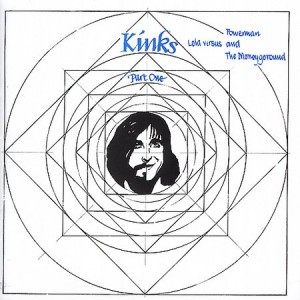
“Lola Vs. The Powerman And The Moneygoround” Was Issued In 1970. The Title Track Made The Kinks Fashionable All Over Again.
Who could blame Ray Davies for lashing out at the industry after the reception that “The Village Green Preservation Society” and “Arthur” were given? Both albums are now deemed as the absolute peak of The Kinks’ career. And at the time of their release, they were virtual non-entities. Something was clearly wrong with the picture. And (by then) you could count the bands that had been screwed as much as The Kinks on the one hand. Well, for their next album Ray was to try and put a spoke on the wheels of the moneygoround, and show the powermen that some things are essentially meant to remain unbound.
The true moment of genesis of the whole album was a delectably convoluted one. The Kinks had released a song named “Lola” in early 1970, and it quickly became their highest charting single in years. The song dealt with a man’s drunken encounter with a transvestite, and while it was no fluff under any concept its release was clearly a derisory move. Of course, the fact that the song did become a transatlantic hit proved how right Ray was on his appraisal of the whole industry.
That set the ball rolling for him, and he began working on “Lola Vs. The Powerman and The Moneygoround”, a concept record in which just everybody came under fire. Music publishers, the press, unions, accountants, yes-men… Nobody came out of it in one piece.
The music on the album was evenly split between ballads and harder-sounding numbers, and (personally) I tend to like the ballads best. “A Long Way From Home” was one of Ray’s better elegies in a period characterized by them, and “Strangers” in particular will always be remembered as one of Dave Davies’ most substantial contributions to their repertoire (for my money, it’’s up there with “Susannah’s Still Alive”).
And Dave also came up with the noisy and dirty “Rats”, a song which is not really a standout but which has a riff to kill for. It always reminds me of John Entwistle’s “Success Story” – not in terms of melody or structure, but rather in terms of accuracy. It fits the whole album so well that Dave could only have written it after having listened to Ray’s demos in order, one after the other. Just like one feels John’s did for penning his sole contribution to The Who’s “By Numbers“.
Still, the most memorable cut on the album is Ray’s “This Time Tomorrow”, a song about life on the road carried by a sublime melody that just can’t get any higher, and great hooks from back to front. And the song has a banjo that almost single-handedly gives the “Muswell Hillbillies” contingent a run for its money in terms of Americanism. Oh, and I’m sure many of you heard it on the movie “The Darjeeling Limited” (which also put “Strangers” and “Powerman” to excellent use).
And in addition to “Lola”, the album yielded a second hit single in the shape of “Apeman”. Impeccably placed after “Rats”, “Apeman” offers a tragicomic take on how exhausting modern life can be. Look – it is all so debilitating that poor Ray had no time to write an original chorus and pinched the chords from the chorus of “Lola” instead. Hehe…
The remaining songs are not really bad, it is just that they are not spectacular either. There are two vaudeville numbers which are over before you can even prick your ears, there is the not-always-tuneful “Top Of The Pops”, a very autobiographical song in the shape of “Get Back In The Line” (about Ray’s father being unemployed, and how that motivated him to get a record deal)… But I am ready to admit that all of the songs are germane to the concept of the album.
So, “Lola Vs. The Powerman and The Moneygoround” managed to revive the band’s commercial fortunes when it was released. In retrospect, it is not as good as either of the albums that came before. But it includes some really, really great music along with some of Davies’ wittiest and most-focused commentary ever. It is not really an essential work, but it is an ineluctable listen once one has begun to scratch behind the surface of The Kinks’ ample catalog, and he wants to know more about the person who was the true creative dynamo of the band. He exposes his fears and insecurities like never before here, but he is never heavy-handed.
And I’m sure that would have happened had Ray written part 2 of this album. That would have been as hard to sit through as Tom Petty’s “The Last DJ”. Biting the hand that feeds you can only be done in style up to a certain point. After that, it’s all venom and acerbity. Kudos to Ray for knowing where to stop.
Rating: 7/10
